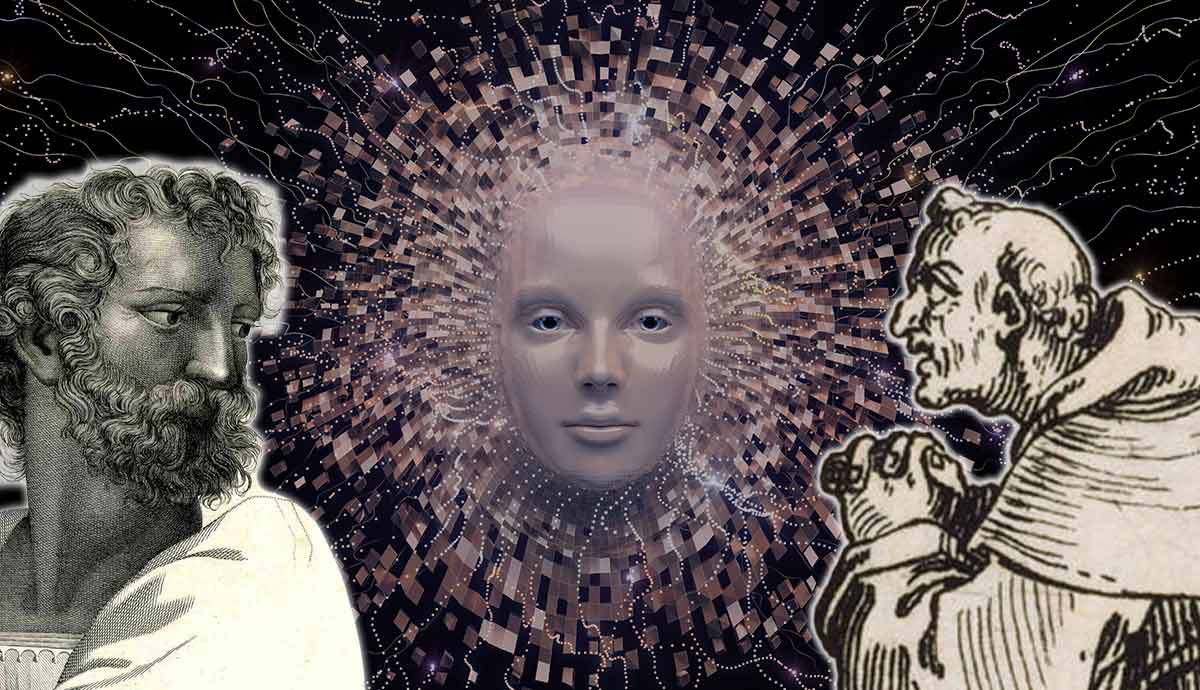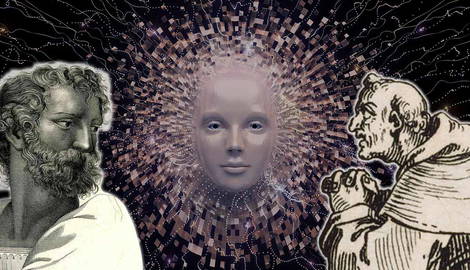
Aristotle’s basic argument was that human beings could abstract, universalize, and freely choose. This is impossible for mere matter. Therefore, a part of human nature is not found in matter. In other words, the soul is at least in part immaterial. Aquinas, heavily influenced by Aristotle, affirms this centuries later with his own thought experiment about an intellect without a will. If both are right, then an actual artificial intelligence is an impossibility.
Aristotle’s ‘Intelligence’

For Aristotle, all living things have souls differentiated by their capacities. Aristotle famously defined the human being as the rational animal. When Aristotle defined something, he gave the genus and then the specifying difference. What differentiates human beings from every other animal and anything found in matter is that humans can reason.
Reason is not to be confused with the ability to think or cognize. Clever animals can think and come up with basic practical syllogisms. Certain birds, for example, have been known to use twigs as prods to draw out food from crevices, demonstrating the ability to use tools. However, human beings have demonstrated the ability to abstract, universalize, and freely choose. Pythagoras developed the Pythagorean theorem with a stylus, a compass, and dirt before Aristotle was born. This is different from the merely clever animal since human beings can understand that such is true of every right triangle. However, human beings still retain the ability to reject this truth.

For Aristotle, the intellect cannot just merely imagine or hold a picture of something in one’s brain. It can understand things—understand their existence through various changes. It can project far into the future and surmise well into the past. This is something mere matter is not able to do. Thus, Aristotle says, “Hence, it is a reasonable inference that it (intelligence) is not involved in the body” (De Anima III.4). The intellect does not seem to share any characteristics of “mattered” things.
Aristotle’s Problem

One problem that Aristotle did not quite account for was if the human soul is immortal, where did it come from? He had convincingly discovered that certain powers of the human soul, such as understanding, universalizing, abstracting, and choosing, were all things that mere matter could not do.
Therefore, those parts of the human soul were not found in matter. They had to be immaterial. However, if such is the case, where does it come from? How does a human soul come into being? While he knows this same question, he does not say much. Only “it remains for the reason alone so to enter, and alone to be divine” (Generation of Animals 2.3, 736b27).
Aristotle’s teacher, Plato, held to the belief in metempsychosis, a kind of philosophical reincarnation not unlike that held by native Indian religions. In this view, the souls undergo several life cycles, as he recounts in the Myth of Er at the end of the Republic. For Plato, learning is more of a recollection of what the soul learned in a previous life.
Aristotle, however, does not ascribe to this conception of the soul. He believes that each human soul is “newly minted” and each mind a tabula rasa upon which conceptual knowledge is formed. However, as already mentioned, the ability to do things that belong to the immaterial must have an immaterial cause. Aristotle also says that “Nature proceeds little by little from things lifeless to animal life…” (History of Animals 8.1, 588b4), which indicates a hierarchy and a spectrum of reality. Given that Aristotle was not an atheist, he believed that man’s rationality somehow came from “above,” though he briefly details what that means.
Aquinas’ Contribution

Thomas Aquinas followed Aristotle on many intellectual trails because he thought Aristotle was never far from the truth. This is saying a lot, given that Aristotle works from a very different intellectual milieu than Aquinas. Aquinas adopted much of Aristotle’s metaphysical framework as a Catholic philosopher and theologian and often wove it with Christian doctrines to produce a coherent worldview.
Picking up where Aristotle leaves off, Aquinas fills in the blank that the immaterial human soul comes from God directly. God ensouls the human embryo, giving it its natural capacities at every successful conception so that it will eventually grow and actualize. In addition to solving that mystery, he further explains the relationship between the intellectual powers of the soul, namely the intellect and will.
He notes that every intellect is also accompanied by a free will and necessarily so. Without a will, he surmises that a pure intellect would be like a lidless eye. It would just take in all manner of information without being able to make judgments and pursue the perfection of its nature, which is knowledge of the truth. And as human beings, in particular, our will is crucial for discerning fact from fiction.
By our will, we can pursue what is good and accept something as true. Likewise, and just as importantly, by our will, we reject what is evil and deny what is false. Of course, we have a tremendous amount of trouble identifying what is truly good from what only appears to be so, but that is the role of the will for the intellect.
The Misnomer of Artificial ‘Intelligence’

A “will-less” intellect—a lidless eye—sounds like what we call artificial intelligence. It takes in all manner of information and can generate word or picture responses that are, in a sense, complex averages of all the information available to it. Still, it will never be able to really judge the truth for itself. A few anecdotes would be sufficient to prove my point.
While researching Thomas Aquinas’ Five Ways, I came across an AI-generated response that said that Aquinas thought God’s existence was self-evident. However, having just read directly for myself, ST I 2.1, Aquinas wrote, “that God exists is not self-evident.” The AI was quoting a contributor from Quora rather than Aquinas himself.
A friend of mine debated with an AI wherein he convinced it that two and two were actually five, not four. And then there is the comic “resourcefulness” of AI that suggested thickening cheese on a pizza using non-toxic glue.
The missing piece to this so-called artificial intelligence is not some algorithm capable of generating hitherto unknown knowledge. A free will can judge what is good or bad, true or false, and noble or base. Until we can locate the physical part of the human being that is the source of our free will and replicate it, AI can never truly be intelligent.
A Hopeless Endeavor?

Here is the problem with locating the physical part of the human being responsible for free will. Many physicalists primarily believe that intellect and free will are epiphenomena of various parts of the brain.
However, if Aquinas and Aristotle are correct, there is no such physical part. Intellect and will are, according to Aristotle, “separated” powers of the soul. This means they are not found in an organ or system of organs in the body. And intelligence is what makes human beings different from every other animal. For Aquinas, this is the spiritual part of humanity, making mankind in imago Dei (the image of God). According to both, true intelligence is not found in matter. It is given from above.
This is not to say that some unexpected, technological epiphenomenon is not possible, far from it. Animals, though not considered intelligent, are capable of various complex forms of cognition and instinctual responses. According to the same philosophers, they are purely material essences. If animal estimations are possible by mere matter, artificial estimation certainly seems to be in the realm of possibility for computers. Artificial estimation, I think, is a more accurate name for and description of what we have been calling “artificial intelligence.”
It seems to me that a true intelligence—one which understands, seeks the truth of reality, and discerns good and evil by its own volition—cannot be made by mankind.








